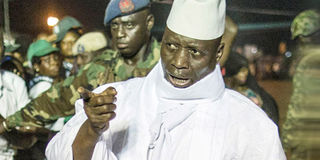Jammeh reminds me of two famous Roman sayings

Gambia's former president Yahya Jammeh
What you need to know:
- Idi Amin who was commander of the attack was rewarded by a promotion but the years that followed saw a lot of political instability leading to the ouster of Obote on January 25, 1971 by his erstwhile army commander Amin.
- Throughout the period to 1981 Uganda struggled to shed off political violence until the entry of the Museveni-led government on January 26, 1986.
- In neighbouring DR Congo, the ouster of Mobutu Seseko brought in Laurent Kabila who renamed the country from Zaire to DR Congo.
The World was on January 20 treated to two different episodes of changing power, one in the US and another in a tinny West African country, the Gambia.
Somewhere in a Gambian embassy in Senegal, Adama Barrow, who defeated one of Africa’s strong men in the December election, Yahya Jammeh, was swearing in after leaving the country for fear of his safety.
In Gambia, Jammeh was chest thumping swearing that he would not leave power and manipulating parliament, whose term had expired to extend his term by three months.
All this was a tale tell script Ecowas refused to read from arguing that Jammeh must leave the presidency and allow the dully elected president, Adama Barrow, to take office.
Slowly-by-slowly Jammeh’s hangers on had started to desert him with the army chief announcing that no one would shed blood for the continued stay of one of Africa’s worst dictators, whose grip on the country spans 22 years.
Ground troops, the navy and jet fighters were put on alert as diplomatic efforts continued to allow a peaceful exit for Jammeh, who eventually gave in to pressure and left the country through Guinea-Bissau on January 21.
What Jammeh did, reminds me of two Roman sayings and ironically they still apply today, especially in Africa.
The first saying, “nemo securus”, is Latin for “no one is secure in this world” and perfectly describes Jammeh, who for 22 years has been holed up in the Gambian state house behind secure walls but had to exit into exile under unceremonious circumstances with crowds cheering his timely fall.
The second one – “nobody knows what will happen tomorrow” again fits well with Jammeh because before the army deserted him he thought he was secure until he was left in the open with a pending attack to force him out of the Gambian state house.
In 1980, Godfrey Binaisa, who was president of Uganda for a year, said: “The presidential chair [read seat] is sweet” and indeed this statement has stood the test of time because in much of Africa after almost 57 year of independence many leaders have had to be forced out either by bloody coups, popular uprisings or contested democratic means.
In Uganda, in May 1966, a bitter disagreement between President Muteesa and Prime Minister Milton Obote morphed into an attack on the Kabaka’s Palace in Mengo, Kampala where a number of people were killed and others imprisoned.
The attack, which led to the abolition of kingdoms and cultural institutions in Uganda, also forced Mutesa to flee into exile in London, UK where he died on November 19, 1969.
Idi Amin who was commander of the attack was rewarded by a promotion but the years that followed saw a lot of political instability leading to the ouster of Obote on January 25, 1971 by his erstwhile army commander Amin.
Throughout the period to 1981 Uganda struggled to shed off political violence until the entry of the Museveni-led government on January 26, 1986.
In neighbouring DR Congo, the ouster of Mobutu Seseko brought in Laurent Kabila who renamed the country from Zaire to DR Congo.
However, his stay was marred by increasing violence until when he was killed by a section in his protection unit and replaced by his then 29 year old son joseph Kabila whose reign, just like further has been dotted by violence and acrimonious civil wars, especially in eastern DR Congo.
In Ethiopia revolutionaries in 1974 crushed the old empire leading to the breakaway of Eritrea.
The revolutions brought in Haile Mengitsu Mariam who ruled Ethiopia with an iron hand for 10 years before he was forced out by a people’s war and fled into Zimbabwe where he lives to date.
In north east Africa a new country, South Sudan, was recently curved out of Sudan but the violence that its people have borne since its creation borders on the extreme.
Such is Africa decemented by violence and political manoeuvring.
From political coups, Africa has gone through one-party system and multi-party system but the systems have been manipulate to create eternal leaders whose desire is to rule for life.
For instance in much of the continent constitutions have been changed with a systematic scrapping term limits.
Truly, what has been done by Ecowas is a new revolution and many people on the continent are waiting to see if the same will be done in a different country leaders refuse to leave.
However, perhaps we can ponder on why African leaders refuse to leave even when people have said no.
Could it be greed or the desire to maintain power that comes with a lot of trappings and privileges?
Kavuma –Kaggwa is an elder from Kyaggwe, Mukono District


